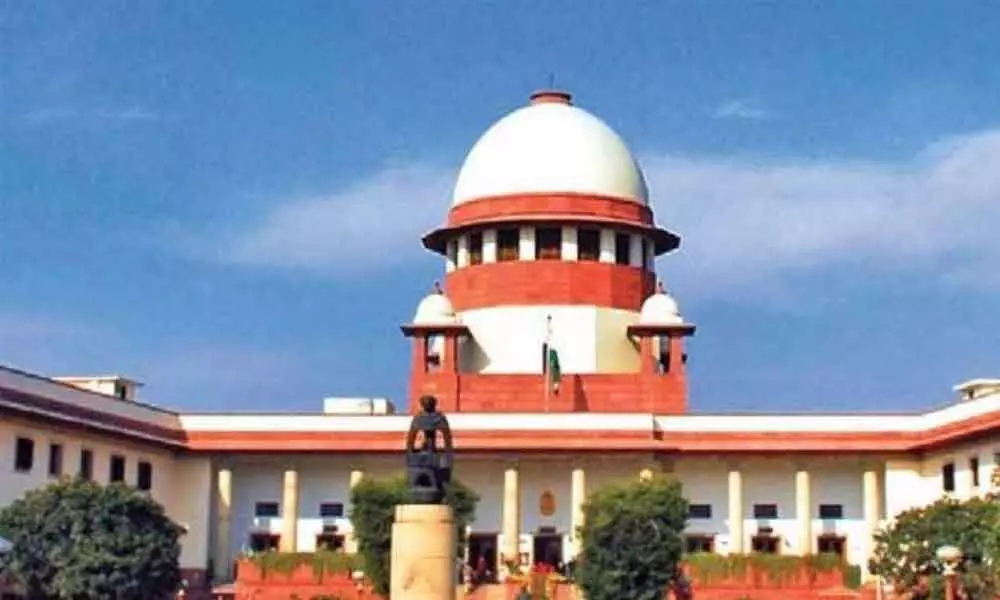Live
- Pushpa 2 Leads to the Capture of Notorious Gangster Vishal Meshram in Nagpur
- WhatsApp to End Support for Older Android Phones From January 1, 2025
- CM Stalin Slams BJP-Led Government Over Election Rules Amendment
- Necrophilia: Chhattisgarh HC Observes Loophole In Indian Penal Code
- Jaipur tanker blast: Vasundhara Raje meets kin of injured, follows medical protocol
- AAP-BJP Showdown Ahead Of Delhi Assembly Elections
- Can a woman make such allegations out of imagination: K'taka Minister
- SA will shine through in Champions Trophy, says Walter after 3-0 loss to Pakistan
- Trump Demands Panama Canal Return, Criticises Panama's Management and Fees
- PV Sindhu Marries Venkata Datta Sai in a Grand Ceremony in Udaipur
Just In
Supreme Court flags concern over fake news, communal colour to news


Supreme Court of India
A section of media gives communal colour to news bringing bad name to the country, the Supreme Court rued on Thursday
New Delhi: A section of media gives communal colour to news bringing bad name to the country, the Supreme Court rued on Thursday, expressing serious concern over fake news on social media, including web portals and YouTube which listen only to "the powerful voices" and not judges and institutions.
The strong observations of the bench headed by Chief Justice N V Ramana came while hearing a batch of petitions, including the one filed by Jamiat Ulema-i-Hind, seeking directions to the Centre to stop dissemination of "fake news" related to last year's religious gathering at Nizamuddin Markaz and take strict action against those responsible for it.
"The problem is, everything in this country is shown with a communal angle by a section of media. The country is going to get a bad name ultimately," said the bench, adding, "Did you (the Centre) ever attempt to regulate these private channels".
The bench also agreed to hear after six weeks the Centre's plea seeking transfer of petitions to the apex court that are pending in high courts against the validity of new Information Technology Rules which aims to regulate online content.
Highlight:
I have not come across where these social media, Twitter and Facebook, respond to common people. They never respond. There is no accountability. About the institutions, they have written badly and they do not respond and say that this is their right. They only worry about powerful men and not judges, institutions or common man. That is what we have seen. This is our experience
– Chief Justice N V Ramana
Solicitor General Tushar Mehta, appearing for the Centre, said, "Not only communal but also planted news" is there and the IT Rules have been framed to regulate content online, including web portals.
The social media only listens to "the powerful voices" and several things are written against judges, institutions without any accountability, said the bench which also comprised Justices Surya Kant and A S Bopanna.
The bench further said: "There is no control over fake news and slandering in web portals and YouTube channels. If you go to YouTube, you will find how fake news is freely circulated and anyone can start a channel on YouTube."
The top court permitted Jamiat to amend its petition and serve it within four weeks to the Centre through the Solicitor General who may file the response in two weeks thereafter. At the outset, Mehta sought an adjournment of hearing on the pleas by two weeks.
Referring to a few last orders, the bench asked the Centre whether it has appointed any regulatory commission for such news contents on social media. Mehta referred to the affidavits of the Ministry of Information and Broadcasting filed on November 13 last year and said that the real concern has been to strike a balance between freedom of press and the right of citizens to have access to unadulterated news.
The bench said there seemed no control on web portals and sought to know about if any mechanism has been put in place. "For newspapers and television channels you have a regulatory mechanism. Are you suggesting that there is no such mechanism for web portals," the bench asked.
Mehta said new IT Rules have been framed to regulate such online mediums including web portals. "There is some mechanism for newspapers and so far as the TVs are concerned, you have some self-regulatory mechanism and one retired Supreme Court judge is also there," the CJI said.
The centre has framed the statutory mechanism under the Cable TV Networks (Regulation) Act, 1995 and for the online contents, the new IT rules have been framed, the law officer said.
Senior advocate Sanjay Hegde, appearing for one of the Muslim bodies, concurred with the submissions of the law officer on new regimes put to regulate the online social media.

© 2024 Hyderabad Media House Limited/The Hans India. All rights reserved. Powered by hocalwire.com






